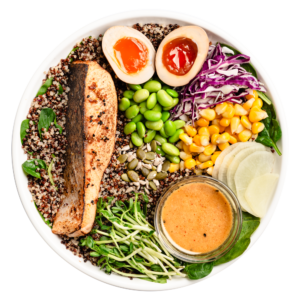Collagen supplements are often seen as the fountain of youth for skin, but are they essential? The short answer is, no. Collagen is a protein made of three main types of amino acids (glycine, proline, and hydroxyproline). These amino acids can be obtained from supplements, food, or synthesized endogenously.
If the body can make its own collagen forming amino acids, then what’s with all the beauty focused supplements? In theory, consuming collagen will enhance collagen production, but this is controversial. The body cannot digest protein whole. Proteins must be broken down into individual amino acids before being absorbed in the small intestine. Therefore, there is no guarantee that the body will use an abundance of glycine, proline, and hydroxyproline to build extra collagen. These amino acids may have other metabolic fates. There are also a multitude of nutrients required for collagen synthesis and healthy skin.
Vitamin C: Antioxidant vitamin that stimulates the biosynthesis of collagen by activating collagen synthesizing enzymes. It also acts directly on DNA to regulate collagen levels. Food sources include bell peppers, cruciferous vegetables (cauliflower, broccoli, Brussels sprouts), oranges, pomelo, lemon, kiwi, potatoes (not boiled and drained), and strawberries.
Zinc: Antioxidant mineral that activates proteins essential for collagen synthesis. Food sources include tofu, legumes (beans, chickpeas, lentils), nuts (walnuts and cashews), seeds (hemp seeds, pumpkins seeds, chia seeds), and whole grains (wholemeal flour, oats, quinoa).
Copper: Mineral that activates an essential collagen formation enzyme. It is also important for energy production. Food sources include nuts (peanuts, cashews, walnuts), seeds (sunflower and sesame), whole grains (brown rice, oats, quinoa), and chocolate.
Vitamin E: Antioxidant vitamin that primarily works as a free-radical scavenger. It can reduce inflammation and skin DNA damage and modulate immune function. Food sources include nuts (almonds, hazelnuts, and peanuts), seeds (sunflower seeds), avocado, and kiwi.
Vitamin A: Antioxidant vitamin that fights inflammation and repairs skin cells. Plant food sources (provitamin A / carotenoids) include pumpkin, squash, spinach, carrots, kale, and orange bell peppers.
Lysine: Essential amino acid found in collagen (3%-4% total amino acid content) that creates the cross-links between molecules that make-up collagen fibres. Food sources include Beans, lentils, pistachios, sunflower seeds, and soy products.
Phytonutrients: Powerful antioxidants in plant foods that fight inflammation. Inflammation is bad news for skin and can lead to redness, rashes, or acne. A higher antioxidant status has been associated with a reduced risk of skin conditions like eczema.
Amino Acids: The skin, bones, tendons, and ligaments of animals and fish contain collagen (glycine, proline, and hydroxyproline) but collagen forming amino acids can also be found in plant foods like glycine (peanuts, almonds, whole grains, beans soy) and proline (cabbage, soy, sunflower seeds, asparagus). The body converts proline to hydroxyproline with the help of vitamin C.
Nutrient rich foods are not the only key to collagen production. We produce less and break down existing collagen faster as we age. We cannot stop aging, but lifestyle choices like smoking, excess drinking, excess sun exposure, high sugar and refined carbs intake, and lack of sleep and exercise will accelerate collagen loss and negatively impact production. The real secret to healthy youthful skin isn’t expensive supplements or gallons of bone soup, but a nutrient dense diet, exercise, and a healthy lifestyle. Make sure to eat at least 5 servings of colourful fruit and vegetables a day and enjoy your green tea!




